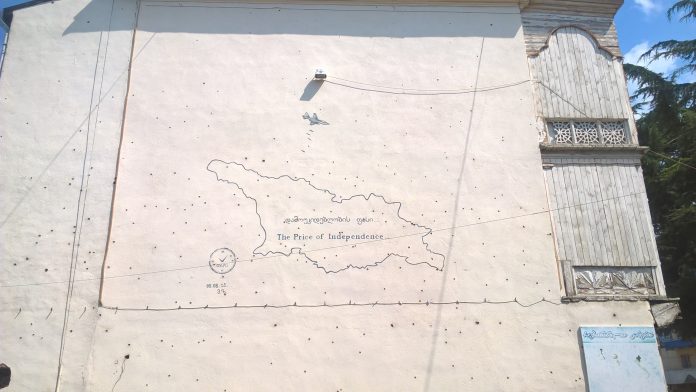August 7 marked the 10th anniversary of the deadly conflict fought over Georgia’s separatist regions South Ossetia and Abkhazia. One decade later, expert George Mchedlishvili tells Euronews that by forgiving Russia’s war with Georgia, the west emboldened the Kremlin ahead of the conflict in Ukraine.
Some background: South Ossetians were accused of siding with the Kremlin after the Red Army invaded Georgia in the early 1920s.That’s how it ended up as an autonomous region within Soviet Georgia, with North Ossetia, on the other side of the Caucasus Mountains, part of Russia.
Then, in the early 1990s, the break-up of the Soviet Union saw Georgia gain independence from Moscow. The subsequent coming to power of Georgian nationalist Zviad Gamsakhurdia helped stoke separatist sentiment and south Ossetians claimed independence from Georgia in 1992.
After three years of sporadic violence, Russia, South Ossetia and Georgia signed a ceasefire agreement in 1992 that saw a three-way peacekeeping force installed.
Fast forward to 2008, Georgia was angered by Russia strengthening ties with South. Fighting broke out between Georgian troops and separatist forces in early August 2008 but it was the launching of a concerted air and ground campaign by Georgia on South Ossetia’s main city, Tskhinvali, that sparked the conflict on the evening of August 7-8.
Russia’s tanks then entered South Ossetia on the pretext of coming to the aid of its citizens — many Ossetians hold Russian passports.
The war lasted five days and 800 people died, according to an official EU fact-finding mission.
Human Rights Watch said forces on all sides “committed numerous violations of the laws of war” during the conflict.
“I believe, had the west reacted adequately to the occupation of South Ossetia back in 2008, Crimea and the war in Ukraine might not have happened,” said Mchedlishvili. “Very unfortunately one can say the west forgave Russia its brutal conduct in Georgia.”
A new ‘horrible’ conflict
Meanwhile, the Associated Press on August 7 reported that an attempt by Nato to incorporate the former Soviet republic of Georgia could trigger a new, “horrible” conflict, Russia’s prime minister said in a stern warning to the West marking 10 years since the Russia-Georgia war.
Dmitry Medvedev said in an interview with the Kommersant daily broadcast by Russian state television that Nato’s plans to eventually offer membership to Georgia are “absolutely irresponsible” and a “threat to peace.”
The European Union on August 7 reiterated its “firm support to the sovereignty and territorial integrity of Georgia within its internationally recognised borders” and lamented the Russian military presence in Abkhazia and South Ossetia.
In a show of support for Georgia, foreign ministers of Latvia, Lithuania and Poland, and a Cabinet member from Ukraine, visited Tbilisi on August 7, urging Russia to withdraw its troops from Abkhazia and South Ossetia. “Nowadays no country can change the borders of another country by force,” said Polish Foreign Minister Jacek Czaputowicz.
According to AP, Russian-Georgian relations have improved since the war, but the issue of the breakaway regions remains, preventing the full normalization of ties.
EU calls on Russia
In a statement, Federica Mogherini, the EU’s High Representative for Foreign Affairs and Security Policy/Vice-President of the Commission, said: “The European Union reiterates its firm support to the sovereignty and territorial integrity of Georgia within its internationally recognised borders.
“Unfortunately, Russian military presence in both Abkhazia and South Ossetia continues in violation of international law and commitments undertaken by Russia under the 12 August 2008 agreement, mediated by the European Union.”
In other related news, Poland called on Russia to “abandon its aggressive and provocative policy” against Georgia. As reported by Radio Poland online, Poland’s foreign ministry issued a statement.
“Ten years ago, as a result of the Russian Federation’s military aggression against Georgia, Abkhazia and the Tskhinvali Region/South Ossetia found themselves under a separatist rule established and supported by Moscow that is not recognised by the international community,” the Polish foreign ministry said in its statement.
It added that it has since 2008 been monitoring the situation in the two regions and has supported the international community’s efforts to restore Georgia’s integrity.

